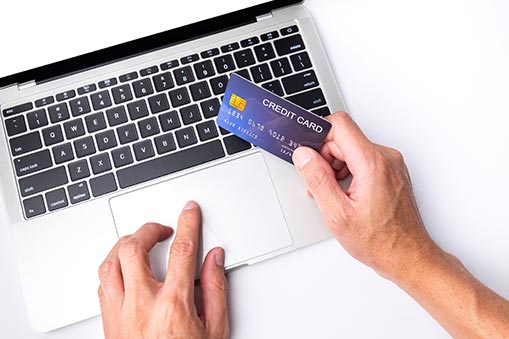Economics professor sees U.S. moving toward cashless society in future
Article body
For safety reasons, many retailers are requesting contactless forms of payment during a transaction. Those retailers who do accept cash payments have been asking customers to use exact change. The combination of people staying home to help slow the spread of the coronavirus and the preference toward using credit/debit cards for health reasons have yielded some interesting economic results during the COVID-19 pandemic. Nicolas Ziebarth, the Ekelund and Hebert Associate Professor of Economics, shares his opinion on whether a cashless business model is likely, and what some of the effects of such a shift might be.
Stores like Kroger have gravitated away from using coins, and banks asking customers to return their coins due to fewer coins being in circulation because of concerns over the spread of the coronavirus. Do you think we are headed toward a cashless business model as a society?
I hope so! I cannot remember the last time I’ve had more than $10 in cash in my wallet. At the same time, I know this is partly a generational thing. My father, on the other hand, loves carrying cash. It’s undeniable though that we are moving away from cash as a society. It’s not simply more brick-and-mortar places no longer accepting cash, but it’s also the rise of online commerce, where a credit card is required.
I think COVID is only affecting this trend around the margins. The biggest effects are again these indirect effects of pushing more and more commerce online. It probably has had some effects on stores no longer accepting cash. Mama Mocha’s, for example, now only takes credit cards.
The fact of the matter is that being cashless is just more efficient, in the same way it was efficient for the U.S. to move away from a gold standard. There are just enormous costs involved in keeping track of physical cash. That’s why businesses are willing to pay credit card transactions fees just to be rid of having to manage physical cash.
Kenneth Rogoff, who is an economist at Harvard, has argued for a broader set of gains from eliminating cash. For example, cash is very important for black-market activities. North Korea has been forging $100 bills to get around sanctions and facilitate illicit trade with other countries. So, if we just eliminated cash, North Korea would have to find some other way to trade without the help of the banking sector. Closer to home, getting rid of cash would also make it more difficult for people to evade their taxes.
What might that mean for people who don’t have bank accounts?
The flip side of people having to carry out illegal black-market transactions without cash is people, who for whatever reason do not have access to a non-cash means of payment, trying to carry out legal ones without cash either. This is a real problem. I do not think we have a clear idea of how large the unbanked group is in the U.S. and how the size [of that segment] would change if we really tightened the supply of paper currency.
One proposal that has been discussed is to allow the postal service to offer financial services through the physical post offices already existing across the country. The hope is that, with sufficiently low fees, this could draw many of the unbanked into the formal banking system. Other countries currently have a system like this, including France, Japan and Italy. Even the U.S. used to have such a system in the first part of the 20th century! So, this is not a radical proposal, but we really do not know if this would work. This is because we really do not know if the major reason people remain unbanked is because of a lack of a physical branch nearby, high fees on low balances, or something else altogether.
What do you see as other long-term, lasting effects to the way people handle their personal finances due to the pandemic?
I will give you a boring answer. It’s still too early to tell. We’ve only been in this for less than six months, and who knows how much longer it will go on? The biggest question is what fraction of time spent working will be from home after the pandemic is over. If even 25% of people end up permanently working from home, this could have major impacts on where people decide to live, housing prices, property taxes, and so on. But this is a dynamic that is going to play out over many years, and it is too soon to know what the consequences will be.
As for personal finances directly, the savings rate in the US quadrupled between February and April to over 30%. That rate has been above 15% for one other month over the last 50 years. My hunch though is that this spike is transitory and reflects the fact that while incomes have been held up by government transfers, people just do not have the opportunities to spend. It is similar to high savings rates that occur during wars because of rationing. While we have not had rationing, we have had the forced closure of many business for very good reasons! This has suppressed consumption and boosted savings. Once the virus is under control, spending will go back to what it normally looks like during a severe recession, which is what we now find ourselves in.
Auburn University is a nationally ranked land grant institution recognized for its commitment to world-class scholarship, interdisciplinary research with an elite, top-tier Carnegie R1 classification, life-changing outreach with Carnegie’s Community Engagement designation and an undergraduate education experience second to none. Auburn is home to more than 30,000 students, and its faculty and research partners collaborate to develop and deliver meaningful scholarship, science and technology-based advancements that meet pressing regional, national and global needs. Auburn’s commitment to active student engagement, professional success and public/private partnership drives a growing reputation for outreach and extension that delivers broad economic, health and societal impact.






